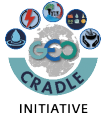GEO-CRADLE focusses on the effective and efficient coordination of existing Earth Observation capacities in North Africa, Middle East and the Balkans. The ultimate aim of the project is to facilitate the sustainable delivery of EO services tailored to the regional needs. In that context, the project undertakes four dedicated feasibility studies in order to showcase how regional EO capacities (i.e. EO data reception infrastructure, modelling capabilities, in-situ networks) can be combined to deliver accurate and timely information in the areas of adaptation to climate change, food security and water extremes management, access to raw materials and energy. Given the importance of data access, sharing, use and re-use in continuously providing such information, GEO-CRADLE delivers a dedicated Regional Data Hub.
Another important contribution of GEO-CRADLE is the establishment of a forward-looking networking platform to support better collaboration between the complete ecosystem of stakeholders (scientists, service providers, end-users, governmental organisations) in the region. This platform allows the different EO actors from the region to stay up-to-date with current developments and opportunities especially in relation to the main thematic areas of the project.
Finally, GEO-CRADLE elaborates a roadmap to propose a concrete set of actions towards the implementation of GEO and Copernicus in the region. This will be informed by the outputs of the feasibility studies and the results of a thorough gap analysis that will allow the identification of regional EO priorities, and EO activities maturity level at national and regional level.
